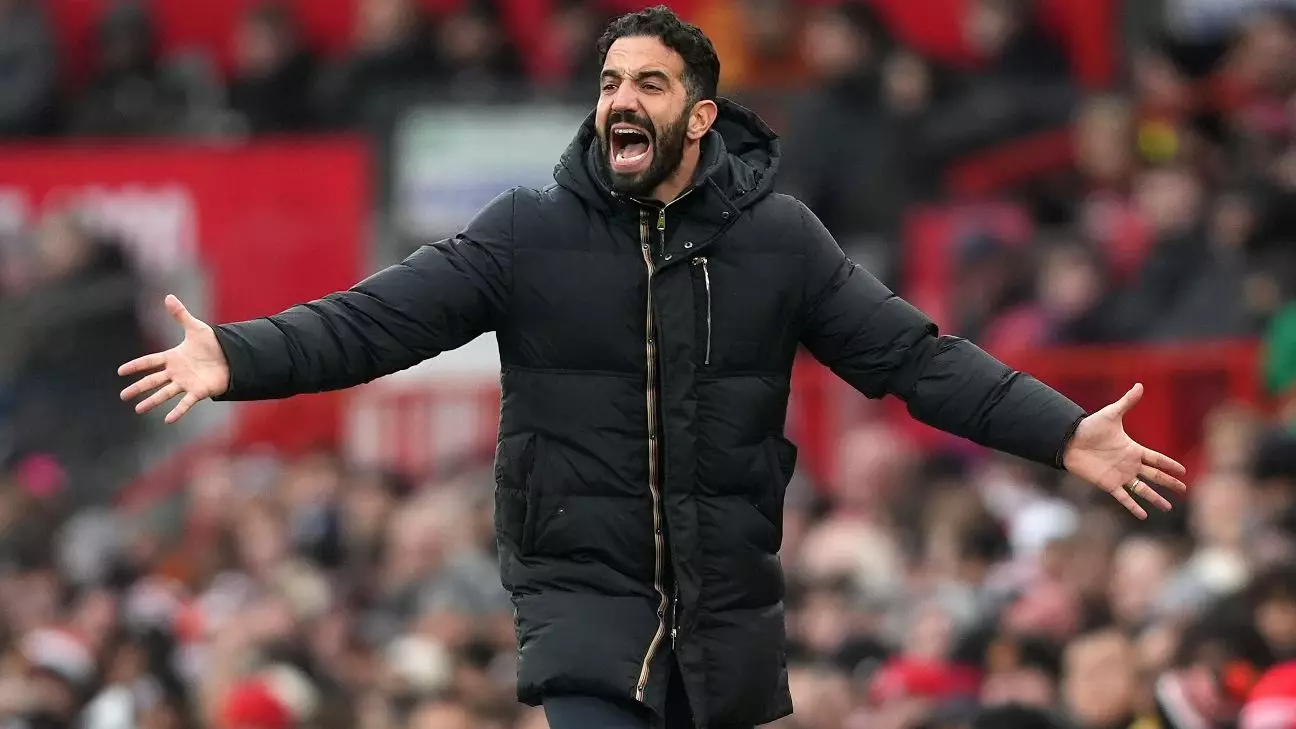In the fast-paced world of football, the pressure to perform can become overwhelming, particularly for coaches assuming the helm mid-season, as is the case with Manchester United’s head coach, Ruben Amorim. Since his appointment in November, Amorim has encountered an inhospitable environment marked by inconsistent performances, highlighted by a dismal record of seven losses out of 13 Premier League matches. The burden of expectation rests heavy on his shoulders, and his recent admission that he is “fighting for his job” underscores the precariousness of his position at one of the world’s most storied clubs.
As he navigates through these turbulent waters, Amorim remains acutely aware of the inherent risks associated with his choices, particularly regarding the January transfer window. His strategy—rooted in a desire to instill a long-term vision for the team—has come at the cost of immediate squad reinforcements. The general sentiment among fans indicates trepidation about the consequences of this approach. The hiring of Amorim, a coach known for his tactical acumen, but lacking experience in intense Premier League pressures, was a gamble that may define his career in the coming months.
The Transfer Window Conundrum
January typically serves as a critical juncture for clubs to bolster their rosters. Yet for United, the window has seen limited activity, which raises alarming questions about the club’s ambition and direction. While Amorim managed to bring in young talents like Patrick Dorgu and Ayden Heaven for defensive fortitude, the departure of key players—namely Antony and Marcus Rashford—has left the attacking unit in disarray. The irony of acquiring defensive options while losing attacking strength may illustrate the complexities of a coach’s strategy amid organizational constraints.
In his recent press briefing, Amorim expressed that while the decision-making process was fraught with risks, it was also a necessary step toward what he sees as a brighter future for the club. One cannot help but wonder, however, if this approach is shortsighted. With the team’s current difficulties in finding the back of the net, Amorim’s belief in patience may be tested as the time for immediate results grows critical. Football is unforgiving, and supporters expect more than just promises of potential improvement.
Surviving in a managerial role at a club like Manchester United demands more than strategic foresight; it requires quick results to adapt to the volatile nature of the sport. Aspiring for victory whilst simultaneously prioritizing long-term growth creates a dichotomy that can be difficult to manage. Amorim, fully aware of the mercurial nature of football, acknowledged in his recent comments the harsh reality of the results-oriented atmosphere he has entered. His candid acknowledgment of the “difficult situation” adds a layer of gravity to his role, revealing the stakes of his ambition.
What sets Amorim apart, however, is his unyielding vision. He espoused confidence that his willingness to take risks will ultimately yield rewards. While this belief is commendable, the underlying question remains: can a coach stay the course when results show no immediate sign of improvement? As fans grow impatient, the pressure intensifies, forcing him to reevaluate his strategies under constant scrutiny.
Moving forward, Amorim faces the dual challenge of addressing tactical inadequacies on the pitch while maintaining a united front within the locker room. His next steps are crucial as the team gears up for a series of critical fixtures in the Premier League. Perhaps time—an asset he claims has been in short supply—is now on his side. With the increase in training sessions resulting from fewer fixture pressures following the transfer window, there exists an opportunity to cultivate cohesion among players and instill confidence amid the uncertainty of the campaign.
Ultimately, the development of Manchester United under Amorim’s direction will be scrutinized intensely. His professionalism, experience, and ability to lead will determine not just his future but also that of a team in dire need of a renaissance. With each match, the narrative of a struggling giant hangs in the balance, making it increasingly important for Amorim to translate potential into performance. The clock is ticking, and the stakes have never been higher.

